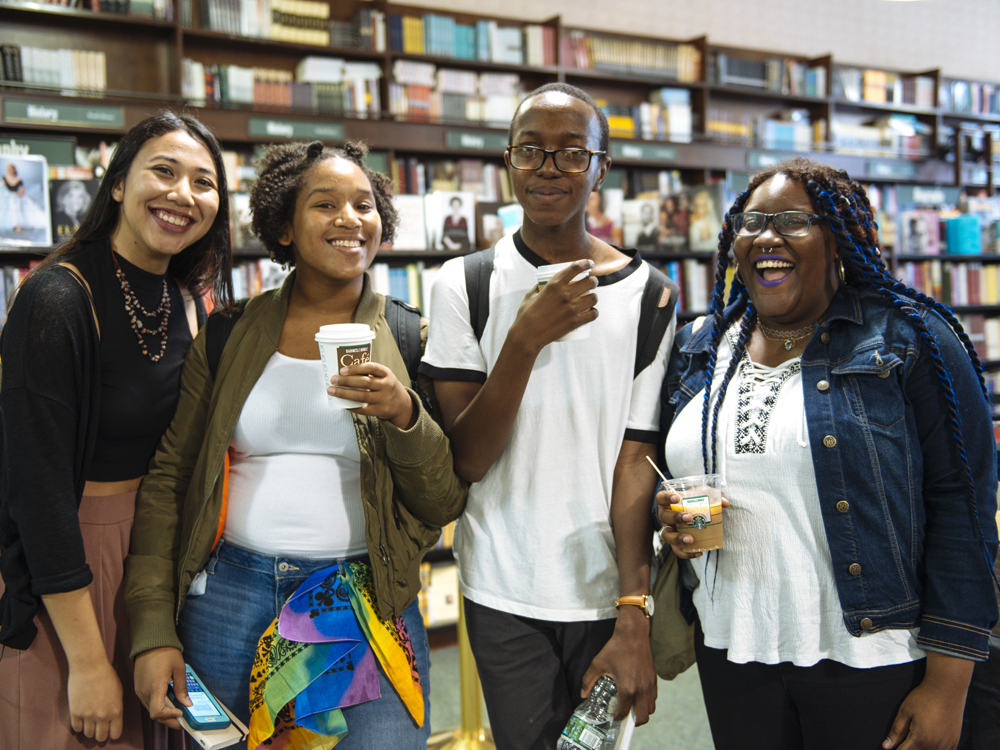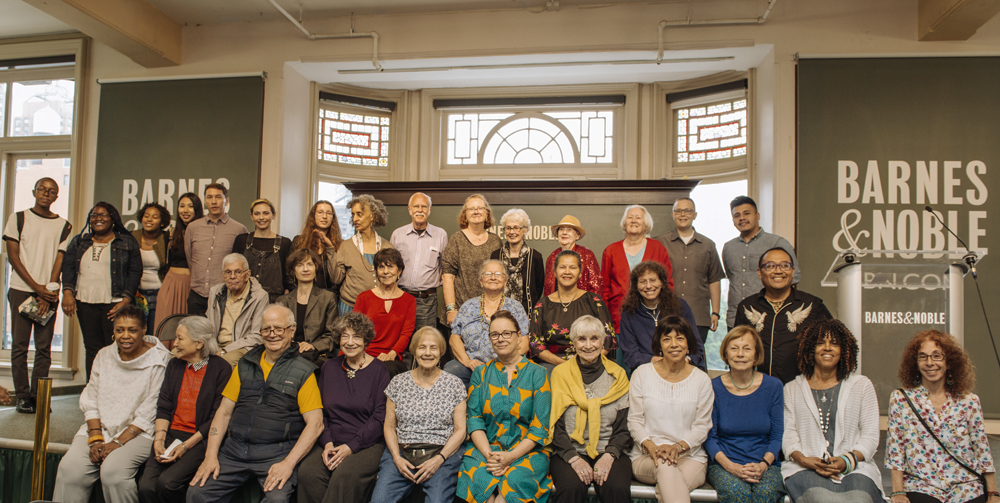Adichie on Feminism, Liu Xia Freed, and More
Study shows films based on books take in more money at the box office; children’s books on refugees; the best-selling books of 2018 so far; and other news.
Jump to navigation Skip to content
Study shows films based on books take in more money at the box office; children’s books on refugees; the best-selling books of 2018 so far; and other news.
App Libib helps users catalog their book collections; a response to William Logan’s review of Ocean Vuong; the changing landscape of romance novels; and other news.
Readings & Workshops (East) director Bonnie Rose Marcus writes about Poets & Writers’ Connecting Generations seventeenth annual Intergenerational Reading held at Barnes & Noble at Union Square in New York City.
 On Saturday, June 23, Poets & Writers held its seventeenth annual Intergenerational Reading at Barnes & Noble at Union Square, where we’ve held the reading for the past seven years. As I listened to the thirty-six writers from the ages of eleven to eighty-six, I thought back to the beginnings of this celebratory reading, when we were given a grant in 2001 from the Louis and Anne Abrons Foundation to conduct writing workshops at senior and teen community centers. Visiting the programs, I was moved by the diversity of voices, and the similarities and differences in the generations. I thought it would be inspiring to bring these generations together. The first Intergenerational Reading was held in a community room at the Goddard Riverside Community Center’s NORC Program, with about six readers and an audience of about twenty.
On Saturday, June 23, Poets & Writers held its seventeenth annual Intergenerational Reading at Barnes & Noble at Union Square, where we’ve held the reading for the past seven years. As I listened to the thirty-six writers from the ages of eleven to eighty-six, I thought back to the beginnings of this celebratory reading, when we were given a grant in 2001 from the Louis and Anne Abrons Foundation to conduct writing workshops at senior and teen community centers. Visiting the programs, I was moved by the diversity of voices, and the similarities and differences in the generations. I thought it would be inspiring to bring these generations together. The first Intergenerational Reading was held in a community room at the Goddard Riverside Community Center’s NORC Program, with about six readers and an audience of about twenty.
This year’s writers were from six programs funded by our Readings & Workshops program: senior writers from the Goddard Riverside Community Center, Grand Street Settlement, the Center for Black Literature at Medgar Evers College in collaboration with Siloam Presbyterian Church, Kew Gardens Community Center, and the Stanley Isaacs and Lincoln Square Neighborhood Center. The teen and young adult writers were from Kamit Preparatory Institute, the National Domestic Writers Alliance, Leslie-Lohman Museum of Gay and Lesbian Art, Newtown Literary Alliance, Concourse House, and Office Hours Poetry Workshop.
Hosting our event was veteran host Regie Cabico, a recipient of a Poets & Writers’ Writers for Writers Award in 2006. A pioneer of spoken word, and the first openly queer and Asian slam poet to take top prizes, Regie continues to perform his unique blend of poetry, stand-up comedy, and theater, and teaches writing workshops throughout North America and the United Kingdom.
Regie’s enthusiasm was contagious. It was evident that each reader felt honored and respected, and was cheered on by Regie and the audience, a full house of about seventy-five people. The writers shared work about loss, abuse, and love: a Tibetan woman read a poem about the suffering in her country, another writer shared a prose poem featuring Noah (and his ark) and Donald Trump, and there were many moving pieces about the challenges and celebrations on life’s journey.
Perhaps the best way to sum up the flavor and value of this reading is to hear from some of the writers themselves:
“It is an extraordinary event for so many reasons. It is an opportunity to hear young and old from so many different vantage points. Many of us may never have that chance of hearing stories from the LGBTQ community, the senior community, or inner-city youth, most of whom are passionate, wistful, angry, and gifted. To see that many participants, some who are facing an audience for the first time, pour out their most intimate feelings with pride and receive kudos for their efforts, is a humbling and inspiring experience.”
—Joyce Berger, Kew Gardens Community Center
“This year, I finally shed a lifelong struggle with stage fright and enjoyed myself at the reading! I also relished everyone’s spoken words, especially those of the younger poets who infuse me with creative energy.”
—Suzanne Pavel, Goddard Riverside Community Center
“I have always felt that one never stops learning. Young folks can learn from seniors and vice versa. This year I had the chance to let young folks know about the real situation in Tibet, because they are our future. Afterwards some of the young folks hugged me and commented on the power of my poem. I also think my poem was timely because of the current situation at our southern borders. What struck me most were the young people who spoke so honestly and showed that poetry is an outlet for all of us.”
—Chukie Wangdu, Stanley Isaacs Neighborhood Center
“Young talents lyrically reported their passions from today’s frontlines while older writers arranged those puzzle pieces left on youth’s table. The reading reminded me that poetry is an instrument played to remember, berate, reveal, coax, question, love, revolt, heal, and most significantly, to witness and connect. Thank you for creating space for all of us!”
—Marty Correia, Office Hours Poetry Workshop

Support for the Readings & Workshops Program in New York City is provided, in part, by public funds from the New York State Council on the Arts, and the New York City Department of Cultural Affairs, with additional support from the Frances Abbey Endowment, the Cowles Charitable Trust, and the Friends of Poets & Writers.
Photos: (top) Dena Igusti, Aaliyah Daniels, Solomon Mussings, and Shakeva Griswould from Urban Word NYC (Credit: Christian Rodriguez). (bottom) Participants of the 2018 Intergenerational Reading (Credit: Christian Rodriguez).The best #bookface Instagram shots; things to know before taking a creative writing class; Kevin Powers on his new Civil War novel; and other news.
“I hear words spoken in the mouths of children, threaded in complex narratives.” At a 92nd Street Y event, Valeria Luiselli reads from her book Tell Me How It Ends: An Essay in Forty Questions (Coffee House Press, 2017), which details her experience as an interpreter for undocumented Latin American children facing deportation.
A profile of Anne Tyler; the legacy of Brazilian writer Joaquim Maria Machado de Assis; summer reading for misfits; and other news.
What do you do to put off important tasks? The social media hashtag #procrastibaking pulls up thousands of posts of goods baked while more pressing matters may have been at hand. Some procrastibakers claim that it’s part of the creative process and can help overcome writer’s block, that the sensory experience and rhythms of following a recipe’s steps can be conducive to warming up to a creative task. Write a personal essay about your own go-to procrastination method. How does your procrastination activity help or hinder your work? Does it do more than satisfy a desire to feel good and enjoy the present while postponing something else?
Scientists published a study in Science magazine earlier this month observing that animals have been sleeping more during the day and increasing nocturnal habits in order to avoid interacting with humans who have steadily encroached upon their habitats and territories. Write a personal essay about a time when you felt the need to change a longstanding routine or habit. Was there a pivotal moment that motivated you to make the change or was it more gradual? How has your own flexibility or adaptability changed over the years?
Thirii Myo Kyaw Myint has won the 2018 Graywolf Press Nonfiction Prize for her manuscript, Zat Lun. She will receive $12,000 and publication by Graywolf Press.
Of Zat Lun, Graywolf Press editor Steve Woodward said, “Myint’s hybrid approach and incorporation of myth and oral traditions overturn expectations around immigrant narratives, and add layers to her parallel investigations of both her family history and that of Myanmar. The whole team at Graywolf is delighted to see this truly original and bold manuscript join the ranks of the Graywolf Press Nonfiction Prize winners.”
Myint is the author of the lyric novel, The End of Peril, the End of Enmity, the End of Strive, A Haven (Noemi Press, 2018). She is completing a PhD in creative writing at the University of Denver.
The Graywolf Press Nonfiction Prize is given biennially for a manuscript-in-progress by a writer not yet established in the genre. Esmé Weijun Wang won the 2016 award for her essay collection, The Collected Schizophrenias, which will be published in February 2019. Other previous winners include Leslie Jamison, Eula Biss, and Kevin Young. Visit the website for more information.
(Photo: Thirii Myo Kyaw Myint; Credit: Dennis Shyu)
What were your favorite books to read for pleasure as a child? In the July/August issue of Poets & Writers Magazine, Christine Ro reports on Alvin Irby’s nonprofit organization Barbershop Books, whose programming creates reading spaces in barbershops to encourage young children to engage with literature. Through the program, Irby hopes to focus on “building boys’ motivation to read and helping them form a self-image as readers.” Write a personal essay about your most treasured and favorite book to read from your youth. What elements of the book resonated with you and encouraged you to take pride in identifying as a reader?